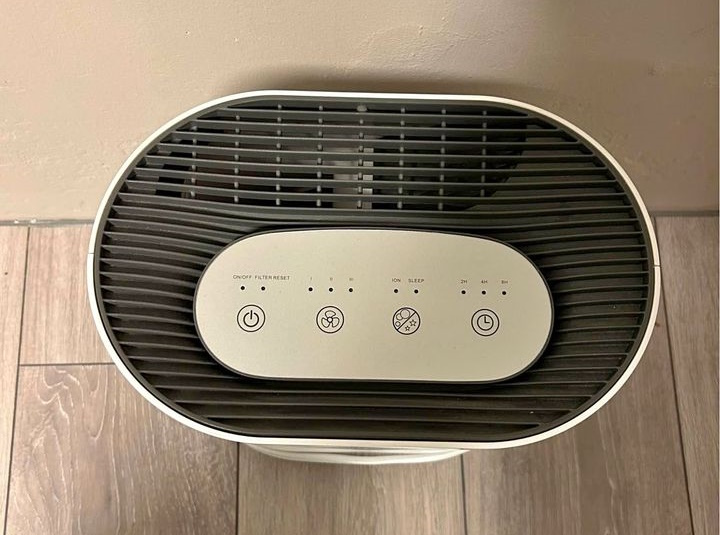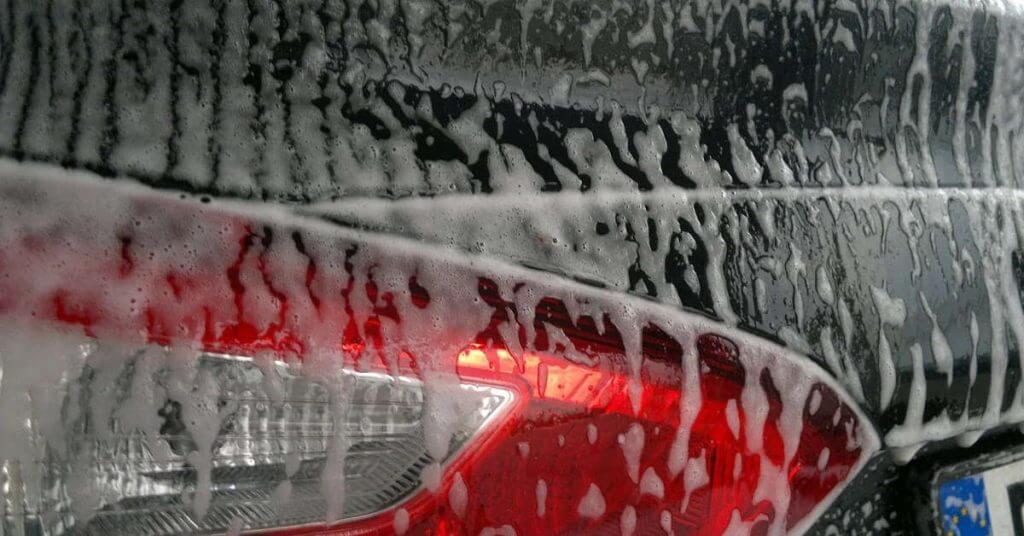When cleaning the car there are some important steps to follow, rinse, soap, rinse, protect, and dry. For this, you need a pressure washer and deionized water. A Greenwork 40V battery-driven pressure washer is perfect when you don’t have access to an electrical outlet where you can clean your car. We only got access to a garden hose in the parking lot. The benefits of the pressure washer with a tank or suction tube are that I can use RO-water (Reverse osmosis) as the water source. Another good alternative to battery-driven pressure washers is the Ryobi Cordless Power Washer if you are into the Ryobi platform or the top-rated WORX Cordless Hydroshot Portable Pressure Cleaner.
The key benefit of using RO-water or deionized water is that it has no minerals that can leave watermarks/spots on the paint job when drying. Using normal water for the last rinse or in hot and sunny weather might leave mineral spots and participation on the finish if not dried properly. That’s the reason for the recommendation to not clean your car in direct sunlight or hot weather.
RO-water has simply had the dissolved solids removed, similar to, but not as completely distilled or deionized. Whereas distilled or deionized water will have essentially all dissolved solids removed, RO water is in the 90% – 95% range for dissolved solids removal.

The Greenwork has more than 3 times the pressure when compared with Ryobi or Worx, 70 bars vs ~24 bars. This can be compared with the standard pressure in the garden hose at ~6 bars.
RO-water does not damage your car or paint job.
RO-water doesn’t damage either your car or your paint job because of the protective coating applied. Water that is produced via reverse osmosis tends to be aggressive because of its high purity and lower levels of dissolved substances. The lower the water’s level of dissolved substances, the more aggressive the water is.

How to clean your car with RO-water
Rinse the car with water from top to bottom to remove any loose dirt and debris. Attach a foam cannon with some Hybrid Solutions Ceramic Wash & Wax or your foam detergent for your car and spray it down.
Let the foam sit for a couple of minutes to work on the dirt and grime before rinsing it off.
How to rinse your car with RO water
The best way is to add a protective no-rinse solution to your final rinse of the car. This will help with the composition of the water and at the same add a protective coating to your car when dry. Because of the use of RO water, there is no need to dry the car afterward, there will be no water spots. This will save you a lot of time and remove the risk of scratching the car’s paint.
Add a small amount of Hybrid Solutions Ceramic Wet Wax to the last rinse water and rinse the car.
Do commercial car washes use RO-water
The top-end commercial car washes use RO water for the last rinse of the car. This is done to remove the risk of having water spots on the finished surface when the water has dried. Contactless car washes use air to dry the car which might result in some spots not being completely dried. When the last rinse solution is RO-water these spots will not result in any watermarks because there are no minerals that can form.

Deionized Water and Its Role in Car Washing:
In addition to Reverse Osmosis (RO) water, another viable option for car washing is deionized water. Deionized water, similar to RO water, undergoes a purification process to remove impurities, minerals, and ions. While RO water typically achieves a 90% to 95% removal of dissolved solids, deionized water takes it a step further, striving for near-total elimination of ions and conductivity.
Advantages of Deionized Water:
Deionized water holds similar benefits to RO water, making it an excellent choice for a spotless car wash. The absence of minerals in deionized water minimizes the risk of watermarks and spots on the car’s surface during the drying process. The high purity of deionized water makes it less aggressive than tap water, contributing to a gentler yet effective cleaning process.
Where to Obtain Deionized Water:
For enthusiasts looking to incorporate deionized water into their car washing routine, several options are available:
- Purchase from Auto Detailing Suppliers: Specialty auto detailing suppliers often offer deionized water in various quantities. Many of these suppliers cater specifically to car enthusiasts and detailers, ensuring a convenient source of high-quality deionized water.
- Water Treatment Companies: Some water treatment companies provide deionized water services for industrial and commercial purposes. Inquire with local providers to explore the possibility of obtaining deionized water for personal use.
- Home Deionization Systems: For a more sustainable and long-term solution, consider investing in a home deionization system. These systems are designed to purify water on-site, providing a continuous supply of deionized water for car washing and other applications.
- Dehumidifier: The standard dehumidifier will create deionized water as a byproduct while converting the humidity to water.

Considerations When Using Deionized Water:
While deionized water offers significant advantages, users should be mindful of a few considerations:
- Storage and Handling: Store deionized water in clean, non-contaminating containers to maintain its purity. Avoid cross-contamination by using dedicated equipment for handling deionized water.
- Cost: Deionized water may be more expensive than traditional tap water or even RO water. Evaluate the cost-benefit based on the desired level of purity for your car washing needs.
By incorporating deionized water into the car washing process, you can elevate the quality of the cleaning routine, ensuring a pristine finish without the risk of mineral deposits or water spots on your car. By doing so you have created a deionized water pressure washer system.
Disclosure: Some of the links above are affiliate links. This means that, at zero cost to you, I will earn an affiliate commission if you click through the link and finalize a purchase.


